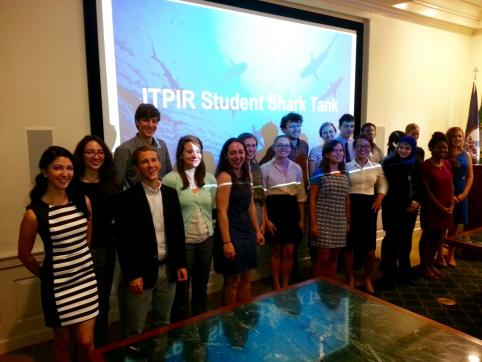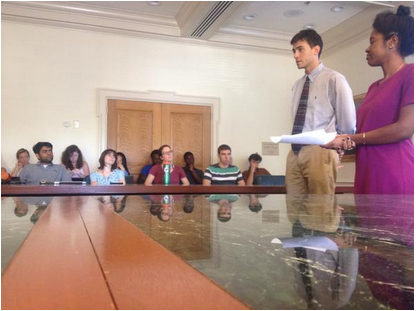
Students who presented at AidData’s Student Shark Tank Competition
With support from USAID’s Global Development Lab (GDL), AidData invested this summer in the next generation of development innovators by hosting the AidData “Shark Tank”, a research competition for students from the Institute for the Theory and Practice of International Relations (ITPIR) at the College of William and Mary (W&M). Inspired by a similar event held in February of 2015 in which AidData’s staff pitched innovative development ideas, teams of students developed research proposals that leverage sub-national spatial data to address relevant policy and research questions over the course of 8 weeks.
On August 6th, student teams pitched to “the sharks” - a panel including Brad Parks, AidData’s Co-Executive Director, Mike Tierney, Co-Founder of AidData and Director of ITPIR at W&M, and Sarah Stafford, Director of W&M’s Master of Public Policy program - to compete for a pot of $16,000. In this article, we profile the 4 awardees and preview how these projects will invest in our students’ growth and further AidData’s mission to make data on financing for development more accessible and actionable.
Introducing the “Shark Tank”
With over 120 student interns and research assistants this summer, AidData continues to develop new ways to foster student-led innovation and entrepreneurship. This summer’s competition leveraged our students’ ingenuity to fund breakthrough research and develop new insights on the use and uptake of sub-national spatial data. In this context, students took advantage of AidData’s resources and innovative methods of data collection to become more active stakeholders in the open data and aid transparency movement. On pitch day, the “sharks” evaluated the proposals on the basis of their feasibility, creativity, salience, and their potential value in advancing AidData’s mission. Sharks invested in winning projects to facilitate their implementation during the 2015-2016 academic year. In addition to financial support, AidData will provide staff time and resources to guide the winning student teams.

Justin Ober and Gabrielle Hibbert, two students on AidData’s non-DAC team, pitching a proposal to georeference subnational data of Indian development finance to Africa.
Student teams submitted proposals for research in a variety of fields and topics, such as: humanitarian response, conflict mitigation, environmental justice, gender inclusiveness, and the impact of emerging economies. The breadth of proposals highlighted AidData’s role as an incubator of disruptive ideas for the varying interests of our student body, as students used AidData’s resources to apply their creativity and pursue projects that fit their personal and academic interests. By collaborating with over 20 AidData staff members and faculty at W&M, as well as members of AidData’s research network of over 80 scholars from 50 institutions from around the world, students found unique applications for AidData’s current holdings of subnational spatial data and its innovative methods of data collection, use, and analysis. Students submitted proposals along three “tracks”, or categories:
Data Track: In this track, students work to improve the comprehensiveness and accessibility of sub-national spatial data. Products include: data collection methodologies, training modules, and/or visualization tools.Policy Track: In this track, students explore questions related to the use and analysis of subnational, spatial data by development stakeholders. Products include: case studies, policy briefs or reports, and/or blog series.Research Track: In this track, students will design new empirical research projects that leverage subnational, spatial data. Products include: protocols for field experiments or Randomized Controlled Trials (RCTs), working papers, poster presentations, and/or theses.
The 4 winners cover a wide range of thematic areas. We will profile each of the winning proposals on First Tranche in the coming weeks.
List of Funded Projects
Project NamePersonnelResearch Question/Problem StatementCountry/Regional FocusReducing Data Gaps in Response to Humanitarian Crises: A Case Study of Project-Level Aid to Respond to Ebola
Aili Espigh, Bella Kron, Caleb Ebert
How can aid responses be more effective in humanitarian crisis situations?LiberiaTracking Venezuelan Development Finance in the CaribbeanDarice Xue
What are the political determinants of emerging donors’ aid allocation? In particular, how does ideology affect emerging donors’ aid allocation?
Venezuela in the CaribbeanForeign Aid and Social Cleavages in Kenya
Emily Walker, Karthik Kumarappan
We will evaluate the impact of foreign aid on social cleavages in developing countries using geotagged Twitter data containing instances of hate speech.KenyaEvaluating Donor Tolerance to Systemic Instability: A Case Study on Boko Haram Violence in Nigeria
Leigh Seitz, Graeme Cranston Cuebas
This project seeks to analyze the impact that Boko Haram violence in Nigeria has on the aid allocation decisions of foreign donorsNigeria
These projects will kick off in the fall of 2015 - join the conversation about these proposals and others by tweeting @AidData with #ADSharkTank, and stay tuned for profiles on the progress of these projects throughout the academic year.

